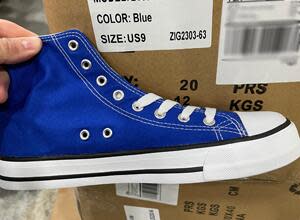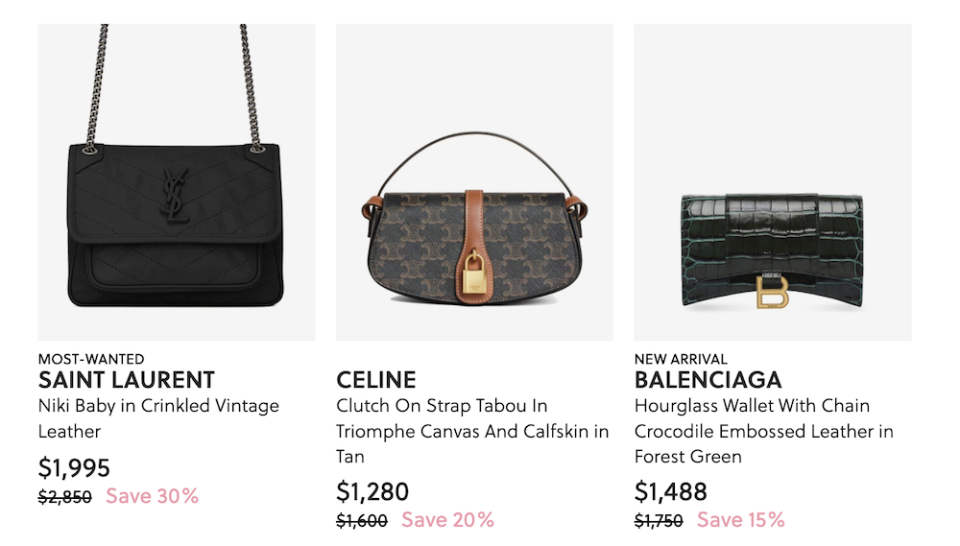CBP Confiscates $314K Worth of Counterfeit Chuck Taylors

Counterfeits continue to flood markets around the globe.
U.S. Customs and Border Protection (CBP) officers in Baltimore seized nearly 14,000 pairs of canvas-topped sneakers that violated the Converse midsole design trademark. Officials say the Los Angeles-bound knock-off sneakers were valued at more than $314,000 if they were authentic.
More from Sourcing Journal
On June 23, CBP officers inspected the shipment, which the manifest said contained “shoes”, of goods coming from China. They decided to send photos of and other documents linked to the shipment to the CBP Office of Trade’s Intellectual Property Enforcement Branch (IPE) for an “infringement determination,” which a few days later confirmed the sneakers as counterfeit. While CBP seized the shoes, no one has yet been charged with a crime.

“Unscrupulous manufacturers and vendors illegally profit on the sale of substandard counterfeit products, such as these fake Chucks, at the expense and safety of American consumers,” Adam Rottman, CBP’s area port director for the area port of Baltimore, said. “Customs and Border Protection urges consumers to protect their health and wallets by buying authentic consumer goods from reputable or authorized vendors.”
Sneakers are a popular knockoff target for global counterfeiters. The Chuck Taylor takedown follows a Massachusetts police operation that detained millions of dollars worth of fake Nikes while authorities in the Philippines seized $28 million in goods that ripped off the Swoosh.
Down in Australia, Cosette has been accused of selling “superfake” designer purses. The allegations against the Sydney boutique, which claims to sell “the most coveted, internationally renowned brands at cut-prices,” were made by several customers and unearthed via a collective investigation by The Sydney Morning Herald, Melbourne newspaper The Age, and Australian TV program “A Current Affair.”
In a segment on a “A Current Affair,” one customer recalls buying her first real designer handbag, a Gucci purse, for $1,541 from Cosette. Though the boutique guarantees authenticity, she “had her concerns” when the item arrived, noting that the bag didn’t have hallmarks of authenticity, such as where it was manufactured. Another customer found that her Prada purchase had a funny smell and looked wrong. She was refunded by the boutique but put out a warning on social media to alert others to question the authenticity of their Cosette purchases.
According to the Sydney Morning Herald, one customer purchased a $4,000 Saint Laurent Envelope Medium Chain Bag from Cosette for $2,400, complete with “mismatched serial numbers” and photos of its alleged authenticity certificate. An independent inspection determined that the bag was a “superfake.”
Now, New South Wales (NSW) Fair Trading—the government agency responsible for consumer protection laws in NSW—is involved and has received 296 complaints since July 24 involving consumer purchases valued at more than $630,000. An investigation has begun, with the complain data set to appear in the watchdog’s August register. Under Australian Law, a consumer is entitled to a refund if goods have been misrepresented, including when fake products are portrayed as genuine, a spokesperson from the agency told Sourcing Journal. And if the Fair Trading legislation has been breached, Cosette could be charged one of the following: $50 million, three times the value of the benefit received, or 30 percent of its annual turnover the preceding year. NSW Fair Trading is urging customers to lodge a complaint online to assist the organization in its investigation as well.

Though Cosette did not immediately respond to Souring Journal’s request for comment, it told securityindustry.com that it denies any claims that it sells counterfeit products.
“Cosette reiterates that any claims that we sell fake bags are false,” according to the statement. “Goods sold by Cosette are genuine and are authenticated independently by third parties. If a customer is concerned with the authenticity of any product sold by Cosette, we encourage them to contact us. Cosette will arrange for a return of the product and reauthentication. If Cosette finds any product to be non-genuine after reauthentication, the customer will be refunded fully.”
CBP warned that counterfeiting not only violates the law but it also steals revenue from the trademarks’ rightful holders, deprives the government of tax revenue and finances transnational crime organizations. Unregulated products can threaten consumers’ health and safety and may be made or sourced from “facilities that employ forced labor,” it added.
CBP officers and Homeland Security Investigations special agents confiscated over 20,000 shipments with goods violating Intellectual Property Rights (IPR) last year alone—with estimates totaling over $2.98 billion, an average of $8 million a day, the agency reported.
Solve the daily Crossword

